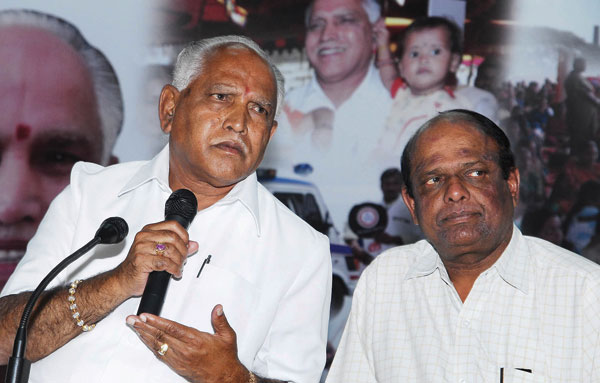BANGALORE: Why is the BJP keen to roll out the red carpet for former CM BS Yeddyurappa? It’s no rocket science, but simple arithmetic.
When the Lingayat strongman spearheaded the 2008 assembly battle, the party secured 33.86% votes and garnered 110 seats. In 2013, in his absence, all the saffron party could get was 19.95% votes and 40 seats. It was humiliating for the national party, as the regional JD(S) got more votes and secured second place.
Did bad governance, infighting and corruption cost BJP dearly? If so, the people should’ve rejected both the BJP and its breakaway factions — KJP led by Yeddyurappa and BSR Congress led by B Sriramulu. All of them were collectively responsible for the mess.
Yet the combined vote-share of the BJP, KJP and BSR Congress in the 2013 polls was 32.48%, just 1.38% less than its 2008 vote share of 33.86%. One shouldn’t forget that the BJP went to polls five years ago, riding on a sympathy wave. It means there was no dramatic change in the voting pattern of the electorate. Interestingly, in Mumbai-Karnataka and Hyderabad-Karnatak region, the combined vote-share of the BJP, KJP and BSR Congress is more than BJP’s vote share in 2008.
“There has been no substantial shift in voter preference for the Congress, JD(S) or BJP and its derivatives. It would be erroneous to interpret the 2013 mandate to be a decisive rejection of the BJP and its breakaway factions. After five years and three chief ministers, and a series of scams, scandals and political instability, less than 2% of voters shifted to the Congress. So neither the Congress nor JD(S) can claim the mandate to be an endorsement of their party or strategy,” observes A Narayana, faculty, Azim Premji University.
BSY impact
Immediately after the polls, Yeddyurappa was quick to prove his ‘destructive powers’ through figures. In 29 assembly segments, the combined vote-share of BJP and KJP candidates was more than the number of votes the winning candidate secured. To cite an example, senior BJP leader K S Eshwarappa was pushed to third place on his home turf in Shimoga, with the Congress candidate winning the polls and KJP coming in second. Most of these 29 constituencies were in Lingayat-dominated North Karnataka.
“I’ve made the BJP realize what it is without me,” the former CM had said. What he tried to convey was that if the split hadn’t happened, the BJP would have got a respectable seat share of at least 70. Though the KJP secured just six seats, it secured 30.68 lakh votes (9.84% of the total votes polled), finished second in 36 constituencies and third in 35 constituencies. Though the BSR Congress could get only four seats, it secured 2.69% votes.
In 2009, under Yeddyurappa’s leadership, the BJP had put forth an impressive performance and bagged 19 of the 28 Lok Sabha seats. This time around, BJP knows it’s no easy task, especially with the Congress in power.
The Lok Sabha polls are important for the BJP-led NDA. As every seat counts, many in the BJP are working overtime to get Yeddyurappa back into the party fold.

